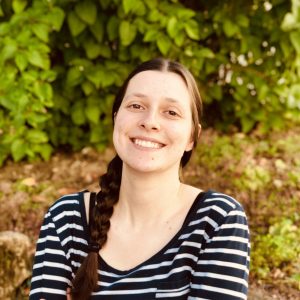ESR 1
Name: Alessia Moruzzi
Host Organisation: Fraunhofer Institute for Interfacial Engineering and Biotechnology, Germany
Project Title: Parallelisable microfluidic Heart-on-a-chip systems with integrated sensing capability to monitor maturation and functionality of cardiac microtissues

The aim of the project is to develop a novel microfluidic system accurately recapitulating the human heart physiology, fitted for non-invasive sensing technologies for real-time monitoring of cardiac tissue maturation and activity.
The main working tasks of the project are:
1. Integrate synthetic hydrogels with defined mechanical properties inside the heart-on-chip device. As it is widely known that cells and tissues respond to mechanical cues in their microenvironment, defining mechanical properties is a key step in engineering physiologically realistic in vitro models of human tissues. Hence, I will test hydrogels with tuneable mechanical properties and quantify cells physical (e.g. mechanical force and strain), morphological and physiological responses to the mechanical microenvironment and to drug compounds.
2. Set-up a toolbox of non-invasive read-out technologies. Several technologies (e.g. Raman spectroscopy and FLIM) will be employed to monitor cells structural and physiological changes during maturation as well as cell responses to treatment with pharmacological compounds.
3. Study maturation of cardiac tissues. I will take advantage of several novel techniques to assess on-chip tissue morphology, expression profiles and real-time changes in culture conditions (e.g. pO2, pH and glucose concentration) during cell maturation.
- École Polytechnique Fédérale de Lausanne, Switzerland for 2 months;
- Miltenyi Biotec GmbH, Germany for 3 months;
- Leiden University Medical Center (LUMC), The Netherlands for 3 months.
In 2016, Alessia obtained a Bachelor’s degree in Biomolecular Sciences and Technologies from the University of Trento, after an experimental internship regarding characterization of Transglutaminase-6 mutants found in patients affected by Spinocerebellar Ataxia 35. She then enrolled at the University of Pavia, where she graduated in 2018 with a Master’s degree in Molecular Biology and Genetics. During the M.Sc. she conducted her Master project on the role of platelets in Alzheimer’s Disease progression. In June 2019, she was awarded with the Marie Skłodowska-Curie fellowship and joined the Loskill Lab to study cardiac microtissue maturation and functionality in microfluidics devices.

